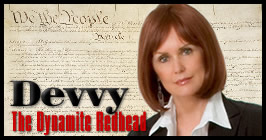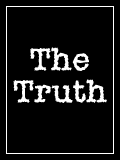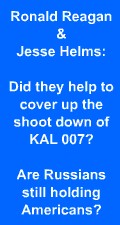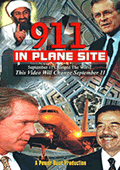Other Devvy Articles:
Forced Mental Health Screening for Your Children
ACLU Demands LA County Remove
Cross From Official Seal
IS
THE WHITE HOUSE SHUTTING DOWN THE PEOPLE'S RIGHT TO KNOW
By: Devvy
October 7, 2004
NewsWithViews.com
According to the 30-organization coalition, Openthegovernment.org, "Secrecy has increased dramatically in recent years under the policies of the current administration." This coalition also maintains that the costs for unnecessarily classifying information and keeping it secret hit an astronomical $6.5 billion in 2003; this excludes the CIA. In 2003, 14 million documents were classified which represents a 40% increase from 2001. This increased veil of secrecy has also caused a huge backlog in filling requests under the Freedom of Information Act. FOIA requests made in 2004 to the Ronald Reagan Presidential Library probably won't get processed until 2008.
This coalition of journalists, the AFL-CIO, government watch dog groups and others charge that this move to shut the people out of their own government and its operations really began in the last years of Bill Clinton's administration. Constitutional hawks with long memories are quick to point out that this type of secrecy was deeply ingrained during the Reagan years, specifically back in 1987 when then U.S. Attorney General William French Smith blew the whistle on a fairly low ranking Marine officer by the name of Oliver North.
According to Smith, Lt. Col. Oliver North directly helped draft a plan in 1984 to impose martial law in the United States in the event of an emergency. This secret plan would suspend the U.S. Constitution and turn over control of the government to the little known agency at that time: FEMA. This plan would appoint military commanders to run state and local governments. Implementation of this plan would have been triggered by violent and wise spread internal dissent, disagreement with government policy or national opposition to any U.S. military invasion abroad. Essentially, it amounted to a complete and total suspension of the U.S. Constitution and Bill of Rights.
Investigators who uncovered this plan believe that between 1983 - 1986, North's office was the 'central command center' for this informal secret structure which involved more than the illegal sale of arms to Iran and illegal funding of the underground war in Nicaragua under President Ronald Reagan. "Lifers" in the military were shocked, saying at the time that no Lt. Colonel is ever given the kind of power North was apparently given within this secret structure. So great was his authority, he could have the orbits of sophisticated satellites altered to follow Soviet ships around the world or launch high-flying spy aircraft on secret missions. Some even compared this whole operation as eerily similar to the one portrayed in the movie, Clear and Present Danger starring Harrison Ford (1994).
North wasn't alone in this secret structure. Others included Reagan's closest advisers: U.S. Attorney General Edwin Meese, CIA Director William Casey and National Security Adviser William Clark. Congressional investigators at the time were shocked by how far along this secret structure and planning had progressed. Arthur Liman, who was the chief counsel of the Senate's Iran-Contra committee stated in a memo that Oliver North was at the center of what he called a "secret government within a government." Prior to those hearings, Liman wrote that a policy decision made at the highest levels during the Iran Contra scandal "...reveals the whole secret government within a government, operated from the Executive Office Building by a lieutenant colonel with its own army, air force, diplomatic agents, intelligence operatives and appropriations capacity."
Investigators further alleged that while North was serving as the NSC's liaison to FEMA, he drafted the plan to impose martial law. Alarmed and incensed over the plan, U.S. Attorney William French Smith dispatched a letter to North's superior at the time, William McFarlane. This August 2, 1984 letter sternly rebuked plans to establish FEMA as an "emergency czar. Smith stated in this letter, "I believe that the role assigned to FEMA in the revised Executive Order exceeds its proper function as a coordinating agency for emergency preparedness. This department and others have repeatedly raised serious policy and legal objections to the creation of an "emergency czar' role for FEMA."
U.S. Attorney General Smith was so incensed over what he called "FEMA's mobilization exercise scenarios - taking over the responsibility of the Department of Justice and other cabinet agencies - he resigned in early 1984. A more pliable Edwin Meese was brought in and in the closing days of his tenure, Smith wrote, "This Department and others have repeatedly raised serious policy and legal objections to the creation of an 'emergency czar' role for FEMA."
Charges of extraordinary secrecy under the current Bush Administration came on the heels of Attorney General John Ashcroft being sworn in as the highest law enforcement officer in the country. The so-called "Ashcroft Memo" on Freedom of Information Act requests has received sound condemnation from all across the political spectrum, "More than any of its recent predecessors, this administration has a penchant for secrecy." David E. Rosenbaum, The New York Times Week in Review, 3 February 2002; "There is a veil of secrecy that is descending around the administration which I think is unseemly." Rep. Dan Burton (R-In.) to ABC News, 22 February 2002; and, "Why does the White House sometimes seem so determined to close the door on the people's right to know what their government is doing? "Mark Tapscott, Heritage Foundation, The Washington Post, 20 November 2002.
According to the National Security Archive, Freedom of Information Audit dated March 14, 2003, "On October 12, 2001, Attorney General John Ashcroft issued a new Department of Justice ("DOJ") FOIA Policy Memorandum to the heads of all departments and agencies ("Ashcroft Memorandum") to supersede the one issued by Janet Reno in October 1993 ("Reno Memorandum"). In replacing the Reno Memorandum, the Ashcroft Memorandum highlighted the importance of Exemption (b)(5) of the FOIA, which permits information to be withheld to protect the deliberative process and other recognized privileges, and counseled that any discretionary decision to release information protected under FOIA should fully consider the institutional, commercial and personal privacy interests that could be implicated by disclosure of the information. In addition, the Ashcroft Memorandum established a new "sound legal basis" standard governing the Department of Justice's decisions on whether to defend agency actions under the FOIA. This differed from the "foreseeable harm" standard that was employed under the Reno Memorandum."
Reactions from senior Republican members of Congress to the Reporters Committee for Freedom of the Press described this alarming new direction towards increased government secrecy which predated September 121, 2001 as 'alarming'. An editorial in the San Francisco Chronicle asserted that the guidance effectively repealed the FOIA ("The Day Ashcroft Censored Freedom of Information," January 6, 2002). The Associated Press opined that this new guidance under these headlines: "Ashcroft ended the practice of cooperating with Freedom of Information Act requests."
In the same audit cited above in which only 10 out of 35 agencies bothered to respond, "The backdrop against which the Attorney General and White House memoranda were issued may well be as important as the policies themselves. The access community has seen efforts since the beginnings of the Bush administration to curtail disclosure:
"Cheney Energy Task Force - In April 2001, Rep. Waxman and Rep. John Dingell, ranking member of the Energy and Commerce Committee, began seeking information about the energy task force headed by Vice President Cheney. The request for information was prompted by news reports that the task force had met privately with major campaign contributors to discuss energy policy. The Bush Administration was unwilling to provide the information, even to the General Accounting Office (GAO), the investigative arm of Congress. The White House took the position that GAO's investigation would unconstitutionally interfere with the functioning of the Executive Branch. Even when GAO voluntarily scaled back its request - dropping its request for minutes and notes - the Vice President's office was intransigent. The Vice President acknowledged only that GAO was entitled to review the costs associated with the task force. The dispute led to GAO filing its first ever suit against the Executive Branch to obtain access to information. GAO's effort failed at the trial level. In December, the district court in the case issued a decision ruling that GAO has no standing to sue the Executive Branch. GAO then decided not to appeal the decision
"Presidential Records Act - When, on January 20, 2001, the Presidential Records Act ("PRA"), 44 U.S.C. � 2201 et seq., 12-year restriction period for records containing confidential communications among President Ronald Reagan, Vice President George H.W. Bush, and their advisers expired, the Bush White House first directed the National Archivist to withhold the records while it "studied" the matter, and then, on November 1, 2001, President George W. Bush promulgated Executive Order No. 13,233 (the "Bush Order"), which purports to give binding directions to the Archivist about how to administer presidential and vice presidential records under the PRA. The Bush Order turned the PRA's public access requirement on its head by granting former Presidents, Vice Presidents, and their "representatives" veto power over any release of materials by the Archivist simply by claiming executive privilege, regardless of the merits of the claim. Only with the "authorization" of a former President or Vice President does the Bush Order permit the Archivist to disclose any presidential or vice presidential records.
"Detainees Names - In the first few days after the September 11 attacks, some 75 individuals were detained on immigration violations. At the same time as the administration sought increased authority from the Congress to detain foreign individuals on the grounds of national security with no judicial oversight, it picked up hundreds more individuals. The Attorney General announced that 480 individuals had been detained as of September 28; 10 days later another 135 had been picked up; and in one single week during October, some 150 individuals were arrested. As of November 5, the Justice Department announced that 1,147 people had been detained. The Attorney General asserted that the Justice Department was following the "framework of the law" and that detainees' rights were being respected. However, with no information released about the arrests, it was impossible to independently verify that claim.
"Homeland Security FOIA Exemption - On November 22, 2002, Congress passed H.R. 5005, the Homeland Security Act of 2002 to create a Department of Homeland Security. It was signed into law (Public Law 107-296) by President Bush on November 25th. The law includes a provision (Sec. 204) that will create a broad exemption from the Freedom of Information Act: "Information provided voluntarily by non-Federal entities or individuals that relates to infrastructure vulnerabilities or other vulnerabilities to terrorism and is or has been in the possession of the Department shall not be subject to section 552 of title 5, United States Code" (the Freedom of Information Act."
Researchers complain that not only are FOIA responses running up to a year behind, but the Ashcroft Memo has virtually sealed up the federal government in a shroud of secrecy that makes holding elected public servants accountable virtually impossible anymore.
� 2004 Devvy Kidd - All Rights Reserved
Devvy Kidd authored the booklets, Why A Bankrupt America and Blind Loyalty, which sold close to 2,000,000 copies. Has been a guest more than 1600 times on radio shows, ran for Congress twice and is a highly sought after public speaker. Devvy is a contributing writer for www.NewsWithViews.com Devvy's web site is: www.devvy.com; is sponsored by El Dorado Gold; e-mail is: devvyk@earthlink.net
U.S. Attorney General Smith was so incensed over what he called "FEMA's
mobilization exercise scenarios - taking over the responsibility of the
Department of Justice and other cabinet agencies - he resigned in early
1984.










